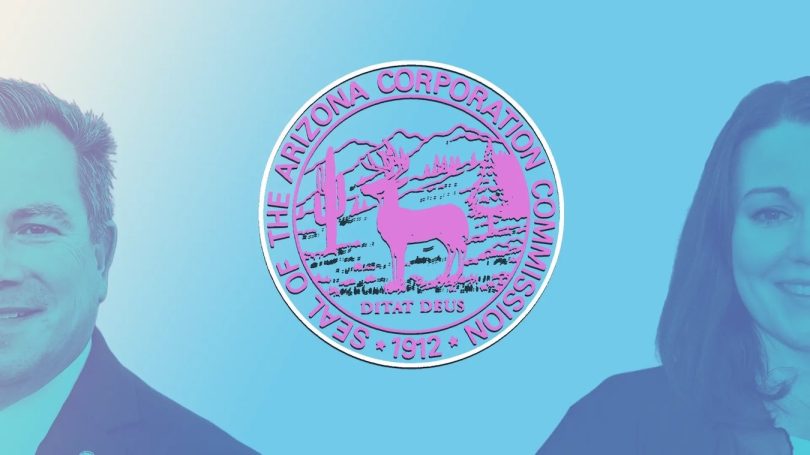The races for three seats on the Arizona Corporation Commission might
be one people overlook on a lengthy 2024 election ballot, but it has
significant economic consequences for Arizonans and even the state’s
LGBTQ+ community, Democratic candidates in the race said.
Five
people are elected to the commission, which oversees utility rates and
licensing for businesses. This year, three seats are up for grabs in
what is currently a supermajority of Republicans (only one Democrat
currently sits on the commission).
Two of the six candidates
running—Rachel Walden and Rene Lopez—have a history of anti-LGBTQ+
platforms and rhetoric: Walden attempted to sue the Mesa Unified School
District for having trans-affirming policies, and Lopez has said he is
against statewide LGBTQ+ protections.
Those past
statements and actions give insight into how they could make decisions
on regulating LGBTQ+ businesses and price increases on a population that
already experiences higher rates of poverty, other candidates said.
“The ACC impacts every single Arizonan,” says candidate Ylenia Aguilar,
who’s running on a platform of increasing the state’s renewable energy
and protecting consumers. “Whether you’re a Democrat, Republican,
Independent, Latino, black, LGBTQ, everyone’s impacted.”
Arguably,
the commission’s most important responsibility is dictating the prices
of water, electricity, and gas for homes and businesses statewide.
Aguilar
said the current ACC has allowed for sizable rate increases and
approved harmful laws that have hurt the Arizona economy and residents
who don’t have a say in the prices of their utilities.
Those living in poverty are affected most.
Nationwide,
LGBTQ+ people experience living in poverty more than their straight
peers. A study done by the Williams Institute of UCLA found that in
2021, 36% of LGBTQ+ families lived in poverty. For single queer people,
they experienced poverty five percentage points more than straight
populations.
It’s unclear if there has been any similar study done for Arizonans.
“People
can’t afford the substantial amount of increases that the current
commission—which has been in Republican leadership for over 20
years—continues to approve,” Aguilar said.
However, the issue
stems beyond just the higher rates, Aguilar said, because the current
committee is not representing Arizonans.
In 2023, Walden—a former Mesa Public Schools governing board member—filed a lawsuit
against Mesa Public Schools over the district’s guidelines for
supporting transgender students. That lawsuit was backed by the legal
group created by Stephen Miller, a former Trump advisor.
The case
states that a school district policy to assist and encourage trans
students was “an astonishing situation that once would have been
unthinkable.”
The district and its superintendent Andi Fourlis assured the guidelines
for supporting transgender and gender nonconforming students were
“intended to help schools ensure a safe learning environment free from
discrimination and harassment.”
Two months before filing the suit, Walden posted transphobic remarks to her Twitter account.
Another candidate, Rene Lopez,
opposes adding “sexual orientation,” “gender identity,” or “gender
expression” to the protected classes of race, religion, age, sex and
ancestry in nondiscrimination law, according to the Arizona Voter Guide, a nonpartisan guide created by the conservative and anti-LGBTQ+ lobbying group Center for Arizona Policy.
Lopez
has also shared posts on his X account from Libs of TikTok, an
alt-right social media account that has made incendiary and violent
claims against LGBTQ+ people and is a source for conspiracy theorists
who believe schools are “transing” children, which is not happening.
To be clear, the ACC can’t alter laws on LGBTQ+ rights. However, the
commission is supposed to represent those who are “voiceless,” Aguilar
said.
“If they’re anti-LGBTQ, they’re anti-immigrant, they’re anti-Muslim, they’re anti-everything,” she said.
Neither Walden nor Aguilar responded to requests for comment.
But
there is an added responsibility with the ACC that Joshua Polacheck,
another commission candidate, said could harm LGBTQ+ businesses:
registering and approving businesses.
Because the ACC is
responsible for licensing and approving corporations and limited
liability companies, Polacheck said the ACC could start forcing out
companies that have environmental, social, and governance policies. ESG
policies can include LGBTQ+-affirming policies for staff and their
families.
“They have talked about banning corporations that
currently have, or have ever had, ESG policies,” Polacheck said. “The
economic impact of that, just to win some political point, is deeply,
deeply concerning.”
Earlier this year, the ACC voted to draft rules to repeal existing rules and mandates for renewable energy, limiting companies’ push to meet ESG goals.
Polacheck, who is endorsed by the political action committee LGBTQ+ Victory Fund,
said elected officials have a responsibility to represent all citizens,
especially if the official works in a portion of government that may be
less known, such as the ACC. Polacheck said Walden’s lawsuit and
Lopez’s stance on the LGBTQ+ community is “not American.”
“It’s wrong, and to do it in such a way where it has nothing to do
with the office you’re running for, normalizes it as a way to take
power,” Polacheck said. “In some ways, that’s worse.”
Polacheck
also said that once someone is elected to the ACC, or any local position
of power, it could put them in line to be elected for a more prominent
position of power, where they could have the power to directly impact
marginalized communities.
But a seat on the ACC isn’t a powerless
position, despite there being perhaps less understanding of the
commission among Arizonans, Polacheck said. He said it was crucial to
understand how the ACC could impact Arizona communities, especially
marginalized ones.
“If you are unhappy with what your electricity
bill or your Southwest Gas bill is… the utilities understand with this
(Republican) majority on the Corporation Commission, they can basically
push for a 10% increase in the bill every single year forever,”
Polacheck said. “So imagine that in line with your household budget.”







